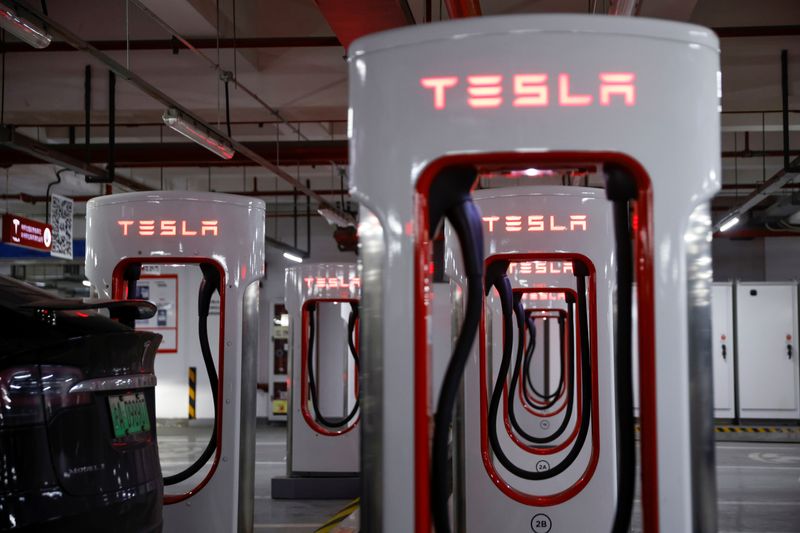© Reuters. Newly installed car chargers at a Tesla Super Charging station are shown in Carlsbad, California, U.S. September 14, 2018. REUTERS/Mike Blake
2/2
By Abhirup Roy
SAN FRANCISCO (Reuters) -Electric vehicle maker Rivian said on Tuesday it will adopt Tesla (NASDAQ:)’s charging standard, giving Rivian customers access to the biggest U.S. charging network and adding momentum to Tesla’s bid to set the industry standard.
Rivian said its customers will be able to access 12,000 Tesla Superchargers with adapters in the United States and Canada as early as spring 2024. The company, which has its own small network of fast chargers, will also make a Tesla-style charging port standard on its vehicles starting in 2025.
“We prefer the Tesla connector, which is more compact, and we also see it as an opportunity to leverage the charging infrastructure that they built,” Rivian CEO RJ Scaringe told Reuters in an interview.
The decision, first reported by Reuters, is one of a series of wins for Tesla. On Tuesday alone, BTC Power said it will add Tesla’s standard to its electric chargers, Texas said it will require state-backed charging stations to include Tesla’s plug, and Hyundai Motor said it will consider making its vehicles more compatible with Tesla’s standard.
Tesla has also struck recent deals with General Motors (NYSE:) and Ford. While other automakers get access to Tesla’s charging network, Tesla stands to profit from selling power to a bigger group of EV drivers.
Shares of Irvine, California-based Rivian jumped, finishing 5.5% higher. Tesla shares closed up 5.3%, bringing gains since the Ford deal was announced in late May to a thumping 49%.
Rivian, which makes the R1T pickup truck and the R1S SUV, said it will continue to expand its own fast-charging network. In 2021, it outlined plans for more than 3,500 charging stations.
Scaringe said Rivian’s network will also adopt Tesla’s standard plugs, opening up a significant revenue stream from Tesla owners using Rivian chargers. “The network will actually become cash flow positive fairly quickly,” he said.
Tesla’s Superchargers account for about 60% of the total fast chargers available in the United States, according to the U.S. Department of Energy.
While other electric car makers need access to reliable charging to allay customers’ fears of being stranded, most have stayed away from building networks as installing and maintaining them requires substantial investment for still-limited returns.
“That’s why I think you’re going to see more and more partnerships,” said Akshay Singh, a partner at consultancy firm PwC Strategy&.
Tesla’s recent deals represent major strides in displacing a rival standard known as the Combined Charging System (CCS) that earlier exclusively had the backing of President Joe Biden’s administration. The government is offering $7.5 billion in funding to speed the deployment of EV chargers in the United States.
Qualifying for some of that federal money had required Tesla to open up its network and the automaker has rebranded the technology as the North American Charging Standard (NACS).
“It’s great to see the industry coming together to adopt the North American Charging Standard,” Tesla’s senior director of charging infrastructure, Rebecca Tinucci, said in a statement.
Manufacturers and operators of CCS chargers such as ABB E-mobility North America, a unit of Swiss industrial firm ABB, Tritium DCFC, EVgo and FreeWire have raced to announce the addition of NACS plugs to their charging stations since the Ford and GM announcements.
Services and other revenue, which includes the fees for using Tesla’s Superchargers, made up just under 10% of Tesla’s revenue in the past quarter. The company does not break out charging revenue alone.
Read the full article here




